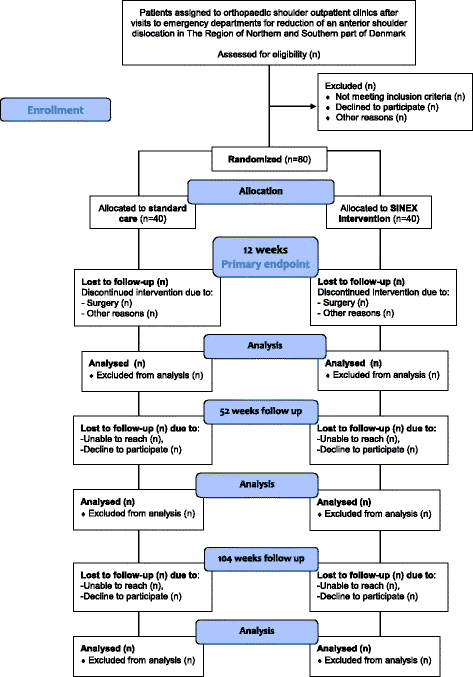A neuromuscular exercise programme versus standard care for patients with traumatic anterior shoulder instability: study protocol for a randomised controlled trial (the SINEX study)
- PMID: 28245853
- PMCID: PMC5331774
- DOI: 10.1186/s13063-017-1830-x
A neuromuscular exercise programme versus standard care for patients with traumatic anterior shoulder instability: study protocol for a randomised controlled trial (the SINEX study)
Abstract
Background: Anterior shoulder dislocation is a common injury and may have considerable impact on shoulder-related quality of life (QoL). If not warranted for initial stabilising surgery, patients are mostly left with little to no post-traumatic rehabilitation. This may be due to lack of evidence-based exercise programmes. In similar, high-impact injuries (e.g. anterior cruciate ligament tears in the knee) neuromuscular exercise has shown large success in improving physical function and QoL. Thus, the objective of this trial is to compare a nonoperative neuromuscular exercise shoulder programme with standard care in patients with traumatic anterior shoulder dislocations (TASD).
Methods/design: Randomised, assessor-blinded, controlled, multicentre trial. Eighty patients with a TASD will be recruited from three orthopaedic departments in Denmark. Patients with primary or recurrent anterior shoulder dislocations due to at least one traumatic event will be randomised to 12 weeks of either a standardised, individualised or physiotherapist-supervised neuromuscular shoulder exercise programme or standard care (self-managed shoulder exercise programme). Patients will be stratified according to injury status (primary or recurrent). Primary outcome will be change from baseline to 12 weeks in the patient-reported QoL outcome questionnaire, the Western Ontario Shoulder Instability Index (WOSI).
Discussion: This trial will be the first study to compare the efficacy and safety of two different nonoperative exercise treatment strategies for patients with TASD. Moreover, this is also the first study to investigate nonoperative treatment effects in patients with recurrent shoulder dislocations. Lastly, this study will add knowledge to the shared decision-making process of treatment strategies for clinical practice.
Trial registration: ClinicalTrials.gov, identifier: NCT02371928 . Registered on 9 February 2015 at the National Institutes of Health Clinical Trials Protocol Registration System.
Keywords: Dislocation; Instability; Neuromuscular exercise; Nonoperative treatment; Physiotherapy; Shoulder.
Figures
Similar articles
-
Neuromuscular Exercises Improve Shoulder Function More Than Standard Care Exercises in Patients With a Traumatic Anterior Shoulder Dislocation: A Randomized Controlled Trial.Orthop J Sports Med. 2020 Jan 30;8(1):2325967119896102. doi: 10.1177/2325967119896102. eCollection 2020 Jan. Orthop J Sports Med. 2020. PMID: 32064291 Free PMC article.
-
External rotation immobilization for primary shoulder dislocation: a randomized controlled trial.Clin Orthop Relat Res. 2014 Aug;472(8):2380-6. doi: 10.1007/s11999-013-3432-6. Clin Orthop Relat Res. 2014. PMID: 24385033 Free PMC article. Clinical Trial.
-
Progressive early passive and active exercise therapy after surgical rotator cuff repair - study protocol for a randomized controlled trial (the CUT-N-MOVE trial).Trials. 2018 Sep 3;19(1):470. doi: 10.1186/s13063-018-2839-5. Trials. 2018. PMID: 30176943 Free PMC article.
-
Shoulder dislocations in the young patient.Orthop Clin North Am. 2000 Apr;31(2):217-29. doi: 10.1016/s0030-5898(05)70142-5. Orthop Clin North Am. 2000. PMID: 10736391 Review.
-
Shoulder instability: management and rehabilitation.J Orthop Sports Phys Ther. 2002 Oct;32(10):497-509. doi: 10.2519/jospt.2002.32.10.497. J Orthop Sports Phys Ther. 2002. PMID: 12403201 Review.
Cited by
-
Patients with non-operated traumatic primary or recurrent anterior shoulder dislocation have equally poor self-reported and measured shoulder function: a cross-sectional study.BMC Musculoskelet Disord. 2019 Feb 8;20(1):59. doi: 10.1186/s12891-019-2444-0. BMC Musculoskelet Disord. 2019. PMID: 30736761 Free PMC article.
-
Conservative management following closed reduction of traumatic anterior dislocation of the shoulder.Cochrane Database Syst Rev. 2019 May 10;5(5):CD004962. doi: 10.1002/14651858.CD004962.pub4. Cochrane Database Syst Rev. 2019. PMID: 31074847 Free PMC article.
-
Neuromuscular Exercises Improve Shoulder Function More Than Standard Care Exercises in Patients With a Traumatic Anterior Shoulder Dislocation: A Randomized Controlled Trial.Orthop J Sports Med. 2020 Jan 30;8(1):2325967119896102. doi: 10.1177/2325967119896102. eCollection 2020 Jan. Orthop J Sports Med. 2020. PMID: 32064291 Free PMC article.
-
Muscles Functioning as Primary Shoulder Movers Aid the Rotator Cuff Muscles in Increasing Active Glenohumeral Stiffness.Ann Biomed Eng. 2025 Jun;53(6):1328-1343. doi: 10.1007/s10439-025-03683-5. Epub 2025 Mar 18. Ann Biomed Eng. 2025. PMID: 40100611
-
Current Concepts in Rehabilitation for Traumatic Anterior Shoulder Instability.Curr Rev Musculoskelet Med. 2017 Dec;10(4):499-506. doi: 10.1007/s12178-017-9449-9. Curr Rev Musculoskelet Med. 2017. PMID: 29038953 Free PMC article. Review.
References
Publication types
MeSH terms
Associated data
LinkOut - more resources
Full Text Sources
Other Literature Sources
Medical


